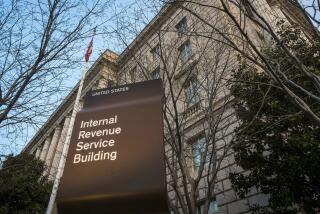IRS to Hasten Prosecution of Frivolous Tax Claims
- Share via
Taking aim at the growing ranks of tax protesters, the IRS said Monday that it will change its internal auditing procedures to speed up the prosecution of individuals who file frivolous claims to avoid paying income tax.
Specifically, the IRS said it will no longer offer time-consuming technical advice on a laundry list of issues that are commonly raised by tax protesters--and which have been repeatedly found by the courts to be groundless. Such requests for advice could tie up IRS audits for months or even years.
“We have seen cases where taxpayers are prolonging the course of an audit by requesting technical advice,” said Don Roberts, an IRS spokesman in Washington. “It’s a delaying tactic that was being used. This [new rule] is aimed at knocking that tactic out of the ballpark.”
The new IRS rule is the latest attempt by the federal government to come to grips with the growing problem of tax protesting--nonpayment of federal income tax on grounds that the tax is unconstitutional or applies only to certain groups of Americans.
This year, Congress heard testimony that tax fraud--which includes tax protesters--has grown to about $300 billion annually. One expert testified that tax protesting in particular is a growing problem, evolving from “a secret of the very wealthy to a mass-marketed business.”
“Their strategy is to protest everything, challenge everything,” said Robert L. Sommers, a San Francisco-based tax attorney and founder of the tax Web site called Tax Prophet. “The idea is just to muck up the bureaucratic operation--throw as much sand in the gears as possible.”
The IRS has never lost a court case on the issue of whether income is taxable or the U.S. tax system is constitutional, Roberts said. There have been more than 500 such cases decided by various courts, Sommers said. Although some of these taxpayers have not been convicted of criminal tax violations, which can result in a prison sentence, they were all subject to civil penalties, he said.
The IRS does not specifically mention tax protesters in the new rule. However, the arguments that the agency has dubbed too frivolous to warrant technical advice cover most of the claims that tax protesters promote.
These include:
* Constitutional claims, including that the requirement to file a tax return and pay taxes constitutes an unreasonable search, barred by the 4th Amendment; violates the 5th and 14th Amendment protections of due process; violates 13th Amendment protections against involuntary servitude; or is unenforceable because the 16th Amendment, which created the income tax, does not authorize non-apportioned direct taxes or was never ratified.
* That income taxes are voluntary or that the term “income” is not defined in the tax code.
* That the preparation and filing of income tax returns violate the federal Paperwork Reduction Act.
* That taxes may be imposed only on coins minted under a gold or silver standard and that the receipt of Federal Reserve notes does not cause an accretion to wealth.
* That taxpayers can refuse to pay taxes because they oppose certain government expenditures.
* That taxes apply only to specific groups, such as government workers, residents of federal territories, such a Puerto Rico, Guam and the District of Columbia.
* That wages are nontaxable receipts or a nontaxable exchange for labor.
The effect on tax protest groups is unclear. Lynne Meredith, owner of We the People, a Sunset Beach organization that maintains that only select groups of “privileged” individuals must pay income tax, said she didn’t believe the ruling would affect those who followed her advice.
“Certainly the IRS can make a ruling on whatever they want to say, but that ruling does not overturn an existing Supreme Court decision,” said Meredith, who is not an attorney and who bases the bulk of her tax arguments on cases from the 1800s and early 1900s.
More to Read
Inside the business of entertainment
The Wide Shot brings you news, analysis and insights on everything from streaming wars to production — and what it all means for the future.
You may occasionally receive promotional content from the Los Angeles Times.










